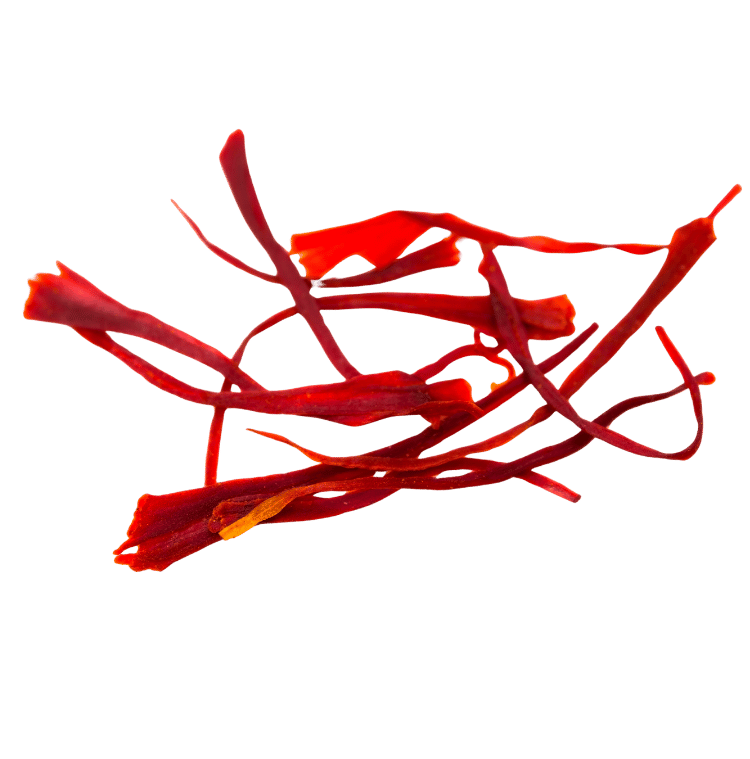
Saffron (Crocus sativus) and its key bioactive compound safranal have been gaining attention in wellness and scientific circles alike. Emerging research points to saffron’s potential in supporting mood, anxiety, sleep, and even ADHD symptoms.
Below, we break down key findings — and for the science lovers, we include a full reference list at the end.
🌿 Saffron’s Effect on Depression and Anxiety
A systematic review and meta-analysis of 23 randomized controlled trials (RCTs) found that saffron supplementation produced a significant positive effect on both depressive symptoms (g = 0.99) and anxiety symptoms (g = 0.95) compared to placebo. This makes saffron one of the most promising natural mood boosters studied to date.
🌿 Saffron vs. Antidepressants
A meta-analysis of 12 clinical studies revealed that saffron was as effective as synthetic antidepressants in improving depressive symptoms — with no significant differences in adverse effects. For people looking for gentler alternatives or adjunctive options, this finding is particularly encouraging.
🌿 Saffron for Sleep Quality
A meta-analysis of RCTs showed that saffron supplementation significantly improved sleep quality, as measured by validated scales like the Pittsburgh Sleep Quality Index (PSQI), Insomnia Severity Index (ISI), and Restorative Sleep Questionnaire (RSQ). Importantly, these improvements came without serious adverse events.
🌿 Saffron’s Role in ADHD
Emerging research suggests saffron may benefit children with ADHD. A randomized, double-blind study comparing saffron (20–30 mg/day) to methylphenidate (Ritalin) found similar effectiveness in reducing ADHD symptoms over 6 weeks. Parents and clinicians reported significant improvements, suggesting saffron might be a natural adjunctive or alternative option, though more research is needed.
🌿 Saffron in Type 2 Diabetes Patients
A double-blind, placebo-controlled trial in type 2 diabetic patients found that taking saffron (30 mg/day for 8 weeks) significantly reduced mild to moderate depression, anxiety, and sleep disturbances. This points to saffron’s potential mental health benefits even in populations managing chronic physical conditions.
🌿 Safranal’s Anxiolytic and Hypnotic Effects (Animal Study)
In an animal study, safranal showed dose-dependent anxiolytic (anti-anxiety) and hypnotic (sleep-promoting) effects in mice, increasing total sleep time without impairing motor coordination. This mechanistic research helps explain saffron’s observed human effects.
🌿 Saffron vs. Placebo and Antidepressants
A meta-analysis of RCTs confirmed that saffron significantly reduced depression symptoms compared to placebo and was similarly effective as antidepressants. These consistent findings strengthen saffron’s profile as a botanical worth watching.
🌿 Saffron and Sleep Quality (Systematic Review)
A systematic review of RCTs examining saffron, crocin, and safranal concluded they improve sleep duration and quality, likely through central nervous system modulation. This adds to the growing evidence base for saffron as a sleep aid.
🌿 Saffron in Treating Anxiety and Depression (Clinical Trial)
A 12-week double-blind, placebo-controlled trial found that saffron supplementation significantly improved Beck Depression Inventory (BDI) and Beck Anxiety Inventory (BAI) scores compared to placebo, reinforcing its potential as a natural mood support intervention.
🔗 References
-
Lopresti AL, Drummond PD. Saffron (Crocus sativus) for depression and anxiety: A systematic review of clinical studies and examination of underlying antidepressant mechanisms of action. Hum Psychopharmacol. 2014;29(6):517–527. PubMed
-
Hausenblas HA, Saha D, Dubyak PJ, Anton SD. Saffron (Crocus sativus L.) and major depressive disorder: A meta-analysis of randomized clinical trials. J Integr Med. 2013;11(6):377–383. PubMed
-
Gerami M, Moosavi SM, Gharraee B, et al. Saffron (Crocus sativus) in the treatment of attention-deficit/hyperactivity disorder in children and adolescents: A randomized, double-blind study. J Child Adolesc Psychopharmacol. 2019;29(4):312–319. PubMed
-
Talaei SA, Azami K, Sadeghi H, et al. Effects of saffron on sleep quality: A systematic review and meta-analysis. Phytother Res. 2021;35(10):5448–5457. PubMed
-
Kashani L, Raisi F, Saroukhani S, et al. Saffron for treatment of major depression: A double-blind randomized clinical trial. J Affect Disord. 2007;107(1-3):149–151. PubMed
-
Noorafshan A, Karimi F, Kamali AM, et al. Saffron and its active ingredient, safranal, affect sleep parameters and anxiety in animal models. Phytomedicine. 2013;20(11):1043–1049. PubMed
-
Milajerdi A, Djafarian K, Hosseini B. The effects of saffron supplementation on symptoms of depression, anxiety, and sleep quality: A systematic review and meta-analysis of randomized controlled trials. Complement Ther Med. 2018;41:196–204. PubMed
-
Azimi P, Yousefi M, Nasiri M, et al. Effects of saffron on depression and anxiety in patients with type 2 diabetes mellitus: A randomized, double-blind, placebo-controlled trial. Complement Ther Clin Pract. 2020;39:101105. PubMed


